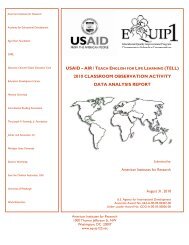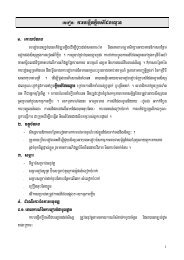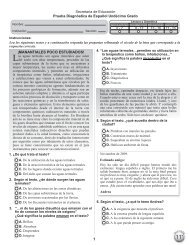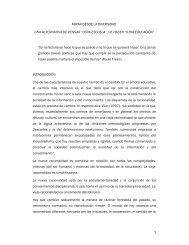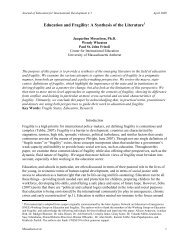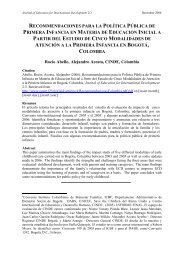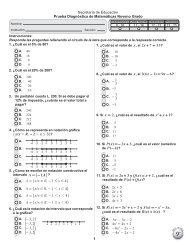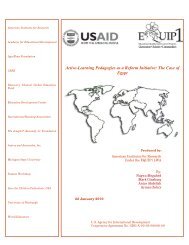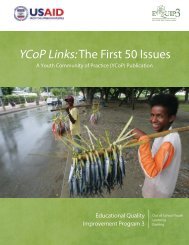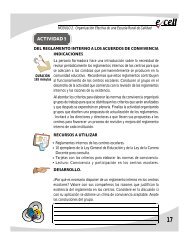The Power of Persistence: Education System ... - EQUIP123.net
The Power of Persistence: Education System ... - EQUIP123.net
The Power of Persistence: Education System ... - EQUIP123.net
You also want an ePaper? Increase the reach of your titles
YUMPU automatically turns print PDFs into web optimized ePapers that Google loves.
the 2004 MOE report on “Reforming Pre-University <strong>Education</strong> Programs,<br />
and the institutionalization <strong>of</strong> decentralization program <strong>of</strong> the 2007 national<br />
“Strategic Plan for <strong>Education</strong>.” Paralleling and reinforcing the words in these<br />
documents were a variety <strong>of</strong> capacity development, organizational restructuring,<br />
planning, and piloting activities. One <strong>of</strong> the most important institutional<br />
factors at this time was the inter-Ministerial committee, which focused on<br />
administrative and financial decentralization pilots in 2007. <strong>The</strong> 2008 elaboration<br />
<strong>of</strong> policies furthering financial decentralization to schools appear to support the<br />
institutionalization <strong>of</strong> these pilot activities in the Egyptian system.<br />
However, at the same time decentralization was being supported by some<br />
actions, other policies were actually strengthening central government authority<br />
and responsibility. While the 2003 national standards identified indicators for<br />
managers at various levels <strong>of</strong> the system, they were also, in effect, centrally<br />
defining how administrators, teachers, students, and the community should<br />
function. Though the 2006 law establishing the National Authority for Quality<br />
Assurance and Accreditation defines a role for school-level and other personnel<br />
to participate in the process, it is a centrally defined framework and process<br />
designed to shape how schools operate.<br />
A particular challenge in decentralizing education is that <strong>of</strong> giving control <strong>of</strong><br />
financial decisions to regions or schools instead <strong>of</strong> to national or Ministry-level<br />
authorities. Beginning in 2006, the Ministry <strong>of</strong> Finance initiated inter-ministerial<br />
discussions aimed at developing and piloting financial decentralization in<br />
selected sites, subject to close evaluation and monitoring. Nevertheless, at<br />
this writing the centralized structure <strong>of</strong> the Egyptian government maintains<br />
budgetary control in the Ministry <strong>of</strong> Finance, which, historically, has not been<br />
open to any delegation or decentralization—especially not at the school level.<br />
In terms <strong>of</strong> community participation, no significant laws or decrees were issued<br />
during the 1980s. Ministerial Decrees in 1993 and 1998 enabled local parentteacher<br />
councils (PTCs) to raise funds and participate in aspects <strong>of</strong> school<br />
governance, including monitoring educational quality. During this period,<br />
parents and other community members became more involved in school matters,<br />
particularly in conjunction with donor projects. <strong>The</strong>re was also a degree <strong>of</strong><br />
community participation in national-level deliberations on education. A 1999 law<br />
establishing an NGO Department in the MOE, permitting NGO involvement in<br />
education and restricting “political” activity was ruled unconstitutional. Another<br />
law passed in 2002 allowed NGOs to receive funds from Egyptian and non-<br />
Egyptian sources. After reform projects activated boards <strong>of</strong> trustees, Ministerial<br />
Decrees in 2005 and 2006 sought to specify membership, responsibilities,<br />
and authority <strong>of</strong> the boards and PTCs. Parental and community involvement<br />
SECTION 2: lESSONS fROM COUNTRY CASE STUdIES<br />
55



